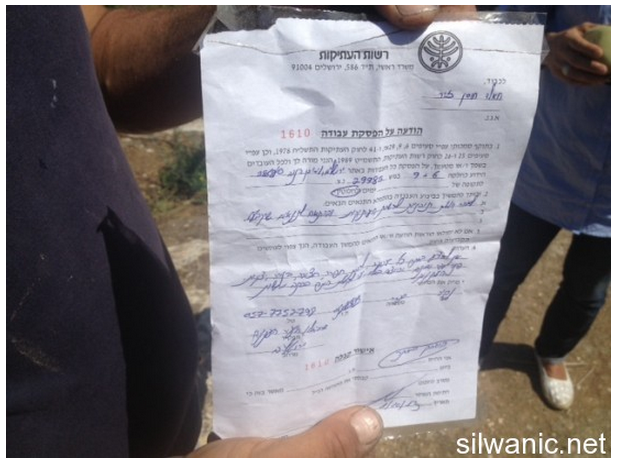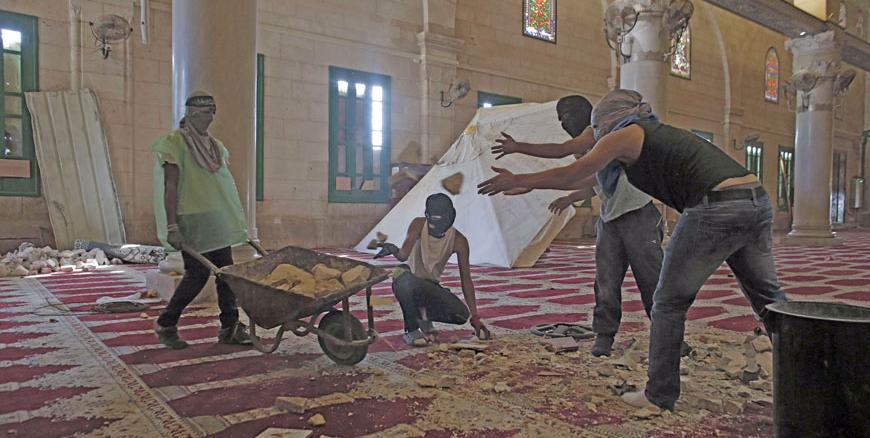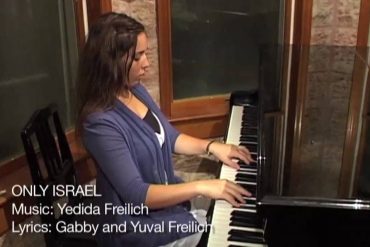As readers may know, the old city of Hebron is on the agenda at a UNESCO conference that opened this week.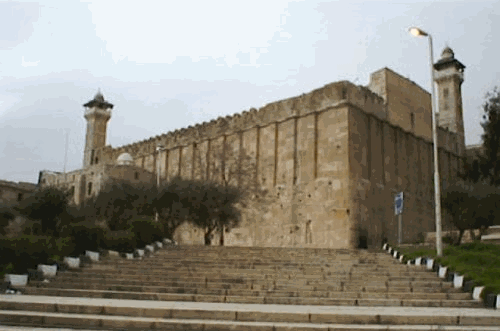
“The meeting will run through July 12 and debate contentious issues like a Palestinian motion to deny Israel sovereignty over Jerusalem and have the West Bank city of Hebron designated as a “World Heritage Site in Danger.” […]
Given the Arab nations’ automatic majority in international forums, the Palestinian proposal is likely to be accepted. […]
The Tomb of the Patriarchs could become the third cultural site on UNESCO’s “List of World Heritage in Danger” that is registered as located in the “State of Palestine.” The other two are the birthplace of Jesus in Bethlehem and the “cultural landscape of Southern Jerusalem,” around Battir.”
Of course this is far from the first time that UNESCO has been exploited for politically motivated denial of Jewish history since the Palestinian Authority joined that UN body in 2011. As in previous cases, professionals have not recommended adoption of the PA’s latest proposal.
“UNESCO experts have warned the Palestinian Authority that it has overly focused on Hebron’s Muslim history at the exclusion of the Judeo-Christian heritage in its request that the West Bank’s city’s “Old Town” be inscribed on the “World Heritage in Danger” list. […]
The PA’s written proposal had focused on Hebron’s “Old Town” history from the Mamluk period of 1250 and onward, which includes the Tomb of the Patriarchs, whose Herodian structure houses both Jewish sanctuaries of worship and the Ibrahimi Mosque. […]
“This means that the association of Hebron with Jewish and early Christian societies is given little recognition, and Tell Rumeida [an area of Biblical Hebron] and other sites are excluded from the boundaries,” the report continued.” […]
This is the third time in a row that ICOMOS has failed to recommend a Palestinian Authority proposal for inscription on the “World Heritage in Danger” list; it rejected both the 2012 proposal to put Bethlehem’s Church of the Nativity and 2014 request to place the ancient agricultural Terraces of Battir on the list.”
However, that professional view is once again unlikely to have any influence over the politicised proceedings at UNESCO, which is why Israel did not cooperate with the ICOMOS (International Council on Monuments and Sites) process.
On the past occasions in which the BBC has produced coverage of PA proposed UNESCO resolutions concerning Israel it has consistently failed to provide its audiences with the relevant information concerning the long-standing Palestinian campaign to erase Jewish heritage and history as part of its tactical delegitimisation of Israel.
Israel freezes Unesco ties for ‘denying Jewish holy sites’ – discussed here
Unesco passes contentious Jerusalem resolution – discussed here
Jerusalem reference found on ancient wine ledger – discussed here
So how did the BBC World Service present this latest story to listeners to ‘Newshour‘ on July 2nd? Presenter James Coomarasamy introduced the item (from 14:07 here) as follows: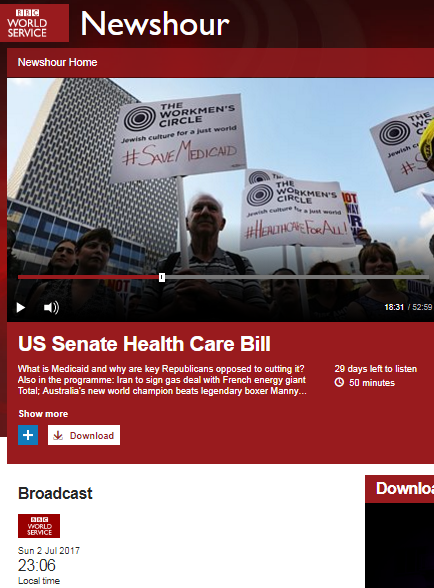
“A UN committee is beginning to consider a Palestinian request to classify the old city of Hebron in the occupied West Bank as an endangered world heritage site. Israel is opposed to the plan.”
With no further explanation, Coomarasamy then gives an inadequate introduction of his sole interviewee, describing an activist in a ‘peacemaking’ group as a tour organiser.
“Eliyahu McLean runs regular dual-narrative tourist visits to Hebron.”
McLean begins by noting that Hebron is “an ancient city” with “at least four thousand years of history” before clarifying that “it’s a holy city to Jews, Christians and Muslims”. He goes on:
“It’s the largest Palestinian city in the West Bank. It’s a centre of the Palestinian economy. It’s also the burial place of our shared ancestor for Jews, Christians and Muslims – Abraham. Abraham, Isaac, Jacob and Leah and Rebecca; all buried in Hebron.”
Coomarasamy then asks a question which might appear less relevant to an item supposedly discussing a proposal to designate part of that city as a world heritage site but nevertheless, listeners do get to hear about a subject – the Hebron Protocol – which is all too often absent from BBC reporting on that city.
“An ancient city but what has its modern history been like?”
McLean: “…It’s also a very divided city. It’s one of the most divided cities in the holy land and if not the world. Here we have a Jewish side of the old city of Hebron and you have a Palestinian side. Now Hebron itself was divided as part of the Hebron Accords in 1997 signed by Yasser Arafat and Benjamin Netanyahu with Bill Clinton presiding. Israel negotiated the withdrawal of 80% of the city. So 80% of the city has been handed over to the Palestinian Authority and that is now called H1 – H for Hebron 1. H2 – 20% of the city – is still controlled by Israel and the Israeli army. Within that 20% there are about twenty to thirty thousand Palestinians and about 1,000 Israeli Jews living there.”
Coomarasamy: “What is life like for both those communities?”
McLean: “H1 is a thriving metropolitan city; there’s industry, there’s three universities, there’s hospitals […] Now within the old city is where there is tensions and conflict. In the old city you have the Tomb of the Patriarchs. I’m Israeli and I help run a weekly dual-narrative tour to Hebron and we take travelers from around the world to go to Hebron and for half a day I hand them over to a Palestinian guide and they hear the Palestinian narrative of victimisation, of occupation. They feel that they’re living under oppression; violence by settlers, violence by soldiers. The Israeli Jews who live there feel that they’re not just occupying and stealing other people’s land – Palestinian land – but that the Jews in fact have an ancient historical connection. In fact Jews lived in Hebron from ancient times; from the time of Abraham through the Roman period, into the Byzantine early Christian period, early Islamic period, the Crusader period. Throughout all of these periods there was an ancient Jewish community that always lived side by side with their Arab Muslim cousins in peace and harmony.”
Glaringly absent from that account is of course any mention of the murder of 67 Jews in the 1929 Hebron Massacre – the event that brought hundreds of years of Jewish life in Hebron came to an abrupt end.
Coomarasamy then finally asks a question related to the item’s supposed subject matter.
“So what are the claims then of the Palestinian Authority that the old city is an endangered place and it needs to be on the World Heritage in Danger list?”
Unfortunately, listeners do not hear a proper answer to that question.
McLean: “The UNESCO decision about making it a world heritage site should take into account not only the very valid and legitimate Islamic historical connections there but the Christian and of course the ancient Jewish connection. Now I think Israel is making a mistake not allowing in some of the committee members so they can see the reality for themselves because I believe that Israel has a valid, legitimate case to make that there is an ancient and legitimate Jewish history and presence that has nothing to do with endangering Muslims. It is true there are a handful of violent settlers who live there who make life miserable and ruin the reputation of the wider community and people that I know in Hebron, they condemn the action of a minority in their midst that do some violent things.”
Coomarasamy ends the item there.
“Hebron tour guide Eliyahu McLean.”
So although BBC audiences around the world do get to hear references to “violent settlers” who are supposedly “occupying and stealing […] Palestinian land” (despite their presence in Hebron being part of an agreement willingly signed by the Palestinian Authority), they do not actually get to hear anything about the substance of the PA’s latest UNESCO bid.
They are not, for example informed that on the PA’s list of complaints:
“…was the placement of security barriers by the Tomb of the Patriarchs and in Hebron’s Old City, as well as an attempt by Jewish residents of the city to purchase property. The Palestinian delegation also protested the use of tear gas in the Old City.”
Neither are they told that Hamas has a major foothold in Hebron, that the city has a new mayor who is a convicted terrorist or that dozens of terror attacks against Israelis have been carried out in the city: a fact obviously relevant to some of those factors claimed by the PA to be ‘endangering’ Hebron.
And of course, as usual in BBC coverage of such stories, the all-important context of the Palestinian Authority’s repeated attempts to delegitimise Israel and erase Jewish history and heritage at the UNESCO forum is glaringly absent from this BBC World Service report.
Related Articles:
UNESCO and the Denial of Jewish History (CAMERA)
BBC R4 programme on UNESCO omits negation of Jewish heritage

